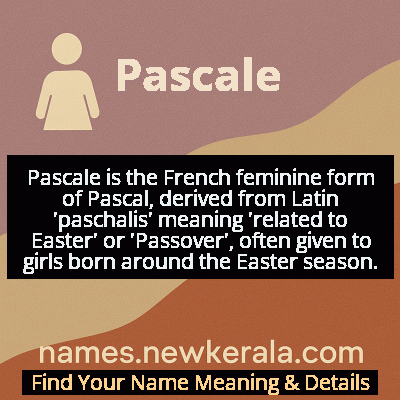Pascale Name Meaning & Details
Origin, Popularity, Numerology Analysis & Name Meaning of Pascale
Discover the origin, meaning, and cultural significance of the name PASCALE. Delve into its historical roots and explore the lasting impact it has had on communities and traditions.
Name
Pascale
Gender
Female
Origin
French
Lucky Number
3
Meaning of the Name - Pascale
Pascale is the French feminine form of Pascal, derived from Latin 'paschalis' meaning 'related to Easter' or 'Passover', often given to girls born around the Easter season.
Pascale - Complete Numerology Analysis
Your Numerology Number
Based on Pythagorean Numerology System
Ruling Planet
Jupiter
Positive Nature
Optimistic, inspirational, and creative.
Negative Traits
Scattered, exaggerating.
Lucky Colours
Yellow, gold, purple.
Lucky Days
Thursday.
Lucky Stones
Yellow sapphire.
Harmony Numbers
1, 2, 9.
Best Suited Professions
Arts, writing, communication.
What People Like About You
Creativity, optimism.
Famous People Named Pascale
Pascale Ogier
Actress
Won Best Actress at Cannes Film Festival for 'Full Moon in Paris' (1984)
Pascale Bussières
Actress
Multiple Genie Award nominations for roles in Canadian cinema
Pascale Hutton
Actress
Starred in popular TV series 'When Calls the Heart' and 'Sanctuary'
Pascale Petit
Poet
Award-winning poet, Manchester Poetry Prize winner
Name Variations & International Equivalents
Click on blue names to explore their detailed meanings. Gray names with will be available soon.
Cultural & Historical Significance
Throughout French literary and artistic history, characters named Pascale often embody qualities of renewal, elegance, and spiritual depth. The name carries connotations of springtime vitality and intellectual refinement, making it appealing across social classes. During the 20th century, Pascale gained popularity beyond strictly religious contexts, becoming appreciated for its melodic sound and cultural heritage. In modern French-speaking societies, the name represents a connection to tradition without being old-fashioned, maintaining its appeal through generations. The cultural significance extends to French-Canadian communities, where it serves as a marker of linguistic and cultural identity, preserving French naming traditions in North America.
Extended Personality Analysis
Individuals named Pascale are typically characterized by a unique blend of creativity, emotional intelligence, and spiritual awareness that reflects the name's connection to rebirth and renewal. They often possess an innate elegance and grace that makes them memorable in social situations, combined with intellectual curiosity that drives lifelong learning. Pascales tend to be deeply intuitive, able to read people and situations with remarkable accuracy, which makes them excellent friends, partners, and colleagues. Their springtime association lends them natural optimism and resilience—they approach challenges as opportunities for growth rather than obstacles.
In professional settings, Pascales often excel in creative fields, education, or helping professions where their empathy and communication skills shine. They balance traditional values with progressive thinking, making them adaptable to changing circumstances while maintaining strong personal principles. The name's religious origins frequently translate into strong ethical frameworks and compassion for others, though this may manifest as humanistic values rather than orthodox religious practice. Pascales are known for their ability to bring people together, often serving as peacemakers or catalysts for positive change in their communities. Their combination of practicality and vision allows them to turn abstract ideas into tangible results, making them valued members of any team or organization.
Modern Usage & Popularity
In contemporary naming practices, Pascale maintains a distinctive presence that balances tradition with modern appeal. While its popularity peaked in French-speaking countries during the mid-to-late 20th century, it continues to be chosen by parents seeking elegant, meaningful names with cultural depth. Current usage trends show Pascale being selected by educated, culturally-aware parents who appreciate its sophisticated sound and rich heritage without being overly common. In France, the name ranks outside the top 100 but maintains consistent usage, particularly among families valuing French linguistic traditions. In North America, Pascale remains relatively rare, giving it an exotic appeal for parents seeking distinctive yet accessible names. The name's international usability makes it appealing to multicultural families and those with global perspectives. Modern parents are drawn to Pascale's connection to renewal and springtime, which aligns with contemporary interests in nature-inspired names and positive symbolism. While not experiencing the surge in popularity of some vintage revivals, Pascale's steady usage ensures it remains a classic choice that won't date quickly or become overused.
Symbolic & Spiritual Meanings
Pascale carries profound symbolic meanings rooted in its etymological connection to Easter and Passover, representing themes of transformation, hope, and cyclical renewal. The name symbolizes the universal human experience of emerging from darkness into light, much like the spring season follows winter or resurrection follows sacrifice in religious narratives. This makes Pascale emblematic of resilience and the human capacity for rebirth after difficult periods. The name also symbolizes cultural and spiritual continuity, connecting ancient traditions with contemporary life through its journey from Hebrew 'Pesach' to modern usage.
Metaphorically, Pascale represents the concept of awakening—both spiritual enlightenment and personal growth. It suggests someone who brings new perspectives and fresh energy to situations, acting as a catalyst for positive transformation. The name's seasonal association makes it symbolic of fertility, creativity, and the natural world's regenerative powers. In psychological terms, Pascale embodies the archetype of the renewer or transformer—someone who facilitates change and growth in themselves and others. The name's religious origins add layers of symbolism related to faith, devotion, and transcendence, while its contemporary usage represents the enduring power of meaningful names across generations and cultures.

